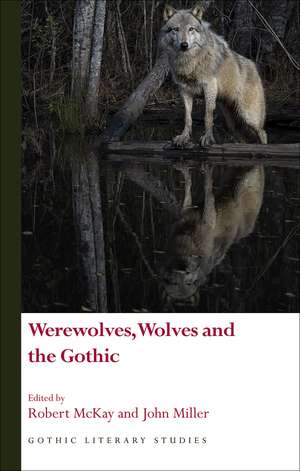Werewolves, Wolves and the Gothic: Gothic Literary Studies
Editat de Robert McKay, John Milleren Limba Engleză Hardback – 15 dec 2017
Wolves are familiar figures in the Gothic imagination, creatures of pure animality that, when combined with the human in the form of the werewolf, offer powerful opportunities to explore complicated anxieties surrounding difference. This is the first volume that deals with the appearance of werewolves and wolves in literary and cultural texts from the mid-nineteenth century to the present. Drawing on representations of werewolves and wolves in literature, film, television, and visual culture, the essays investigate the key texts of the lycanthropic canon alongside lesser-known works from the 1890s to the present. The result is an innovative study that is both theoretically aware and historically nuanced, featuring an international list of established and emerging scholars based in Britain, Europe, North America, and Australia.
Din seria Gothic Literary Studies
-
 Preț: 191.86 lei
Preț: 191.86 lei - 11%
 Preț: 508.59 lei
Preț: 508.59 lei - 11%
 Preț: 508.33 lei
Preț: 508.33 lei - 11%
 Preț: 508.33 lei
Preț: 508.33 lei - 23%
 Preț: 519.74 lei
Preț: 519.74 lei - 11%
 Preț: 509.26 lei
Preț: 509.26 lei - 15%
 Preț: 457.23 lei
Preț: 457.23 lei - 11%
 Preț: 543.42 lei
Preț: 543.42 lei - 23%
 Preț: 515.00 lei
Preț: 515.00 lei - 8%
 Preț: 529.48 lei
Preț: 529.48 lei - 8%
 Preț: 529.48 lei
Preț: 529.48 lei - 8%
 Preț: 529.27 lei
Preț: 529.27 lei - 8%
 Preț: 529.48 lei
Preț: 529.48 lei - 8%
 Preț: 529.80 lei
Preț: 529.80 lei - 8%
 Preț: 494.29 lei
Preț: 494.29 lei - 11%
 Preț: 507.26 lei
Preț: 507.26 lei -
 Preț: 100.81 lei
Preț: 100.81 lei - 12%
 Preț: 190.72 lei
Preț: 190.72 lei - 20%
 Preț: 484.32 lei
Preț: 484.32 lei - 20%
 Preț: 517.99 lei
Preț: 517.99 lei - 21%
 Preț: 578.97 lei
Preț: 578.97 lei - 10%
 Preț: 484.87 lei
Preț: 484.87 lei - 15%
 Preț: 484.87 lei
Preț: 484.87 lei - 10%
 Preț: 484.32 lei
Preț: 484.32 lei - 10%
 Preț: 483.86 lei
Preț: 483.86 lei - 10%
 Preț: 484.32 lei
Preț: 484.32 lei - 14%
 Preț: 837.55 lei
Preț: 837.55 lei - 15%
 Preț: 549.02 lei
Preț: 549.02 lei - 15%
 Preț: 549.02 lei
Preț: 549.02 lei - 11%
 Preț: 543.42 lei
Preț: 543.42 lei
Preț: 579.51 lei
Preț vechi: 691.26 lei
-16% Nou
Puncte Express: 869
Preț estimativ în valută:
110.89€ • 116.10$ • 91.97£
110.89€ • 116.10$ • 91.97£
Carte indisponibilă temporar
Doresc să fiu notificat când acest titlu va fi disponibil:
Se trimite...
Preluare comenzi: 021 569.72.76
Specificații
ISBN-13: 9781786831026
ISBN-10: 1786831023
Pagini: 304
Ilustrații: 6 halftones
Dimensiuni: 140 x 216 x 28 mm
Greutate: 0.51 kg
Editura: University of Wales Press
Colecția University of Wales Press
Seria Gothic Literary Studies
ISBN-10: 1786831023
Pagini: 304
Ilustrații: 6 halftones
Dimensiuni: 140 x 216 x 28 mm
Greutate: 0.51 kg
Editura: University of Wales Press
Colecția University of Wales Press
Seria Gothic Literary Studies
Notă biografică
Robert McKay is senior lecturer in English literature at the University of Sheffield. John Miller is senior lecturer in nineteenth-century literature at the University of Sheffield.
Cuprins
Acknowledgements
List of Contributors
List of Illustrations
Introduction, Robert McKay and John Miller
Social Anxieties
1 Like Father Like Son: Wolf-Men, Paternity and the Male Gothic
Hannah Priest
2 Wicked Wolf-Women and Shaggy Suffragettes: Lycanthropic Femmes Fatales in the Victorian and Edwardian Eras
Jazmina Cininas
3 Postcolonial Vanishings: Wolves, American Indians and Contemporary Werewolves
Michelle Nicole Boyer
4 The Good, the Bad and the Ubernatural: The Other(ed) Werewolf in Twilight
Roman Bartosch and Celestine Caruso
5 ‘Becoming woman’/ Becoming Wolf: Girl Power and the Monstrous Feminine in the Ginger Snaps Trilogy
Batia Boe Stolar
6 ‘Something that is either werewolf or vampire’: Interrogating the Lupine Nature of Bram Stoker’s Dracula
Kaja Franck
7 Saki, Nietzsche and the Superwolf
John Miller
8 A Vegetarian Diet for the Were-Wolf Hunger of Capital: Leftist and Pro-animal Thought in Guy Endore’s The Werewolf of Paris
Robert McKay
9 Everybody Eats Somebody: Angela Carter’s Wolfish Ecology
Margot Young
10 ‘But by Blood No Wolf Am I’: Language and Agency, Instinct and Essence – Transcending Antinomies in Maggie Stiefvater’s Shiver Series
Bill Hughes
11 Transforming the Big Bad Wolf: Redefining the Werewolf through Grimm and Fables
Index
List of Contributors
List of Illustrations
Introduction, Robert McKay and John Miller
Social Anxieties
1 Like Father Like Son: Wolf-Men, Paternity and the Male Gothic
Hannah Priest
2 Wicked Wolf-Women and Shaggy Suffragettes: Lycanthropic Femmes Fatales in the Victorian and Edwardian Eras
Jazmina Cininas
3 Postcolonial Vanishings: Wolves, American Indians and Contemporary Werewolves
Michelle Nicole Boyer
4 The Good, the Bad and the Ubernatural: The Other(ed) Werewolf in Twilight
Roman Bartosch and Celestine Caruso
5 ‘Becoming woman’/ Becoming Wolf: Girl Power and the Monstrous Feminine in the Ginger Snaps Trilogy
Batia Boe Stolar
6 ‘Something that is either werewolf or vampire’: Interrogating the Lupine Nature of Bram Stoker’s Dracula
Kaja Franck
7 Saki, Nietzsche and the Superwolf
John Miller
8 A Vegetarian Diet for the Were-Wolf Hunger of Capital: Leftist and Pro-animal Thought in Guy Endore’s The Werewolf of Paris
Robert McKay
9 Everybody Eats Somebody: Angela Carter’s Wolfish Ecology
Margot Young
10 ‘But by Blood No Wolf Am I’: Language and Agency, Instinct and Essence – Transcending Antinomies in Maggie Stiefvater’s Shiver Series
Bill Hughes
11 Transforming the Big Bad Wolf: Redefining the Werewolf through Grimm and Fables
Index
Recenzii
“This is an excellent collection, addressing one of the limits of the human as represented in the Gothic, namely the recurring theme of ‘becoming wolf’. The essays assume a wide variety of perspectives, in which the historical terrors, desires and hopes of the wolf are brought out into the light.”
“Illuminating rising popular interests in everybody’s love-to-hate hairy monsters amid the decline of their real-life counterparts, this collection of essays makes a compelling case for investigating representations of werewolves and wolves at the nexus of literary animal studies and the ecoGothic.”
